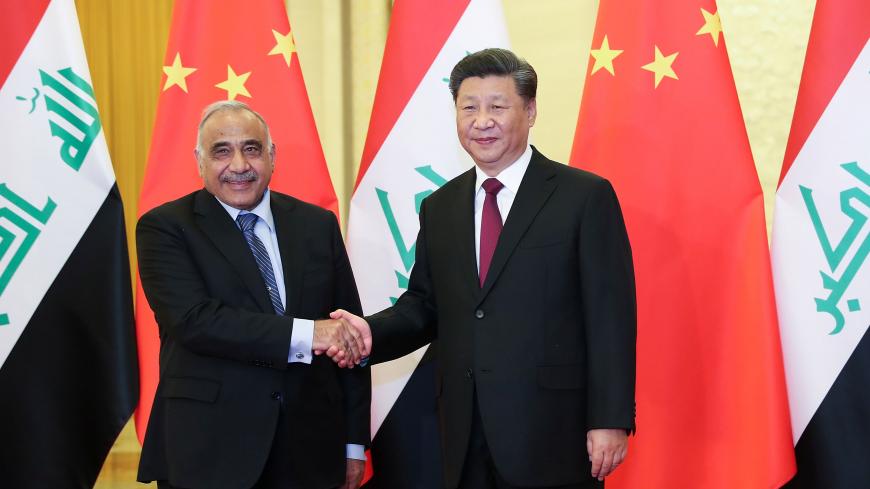BAGHDAD — Iraq's pro-government Shiite blocs are alleging an economic agreement signed between outgoing Prime Minister Adel Abdul Mahdi and China in September is linked to the mass public protests that started in October.
Iran-backed factions of Iraq's Popular Mobilization Units (PMU), which support Abdul Mahdi's government, are promoting a conspiracy theory that the United States engineered the mass protests in Iraq to topple the government and nullify the agreement, to stop China from investing and expanding its influence in Iraq.
Abdul Mahdi seems bent on implementing the agreement with China, though his government no longer has full legal and administrative powers. Since its resignation Nov. 29, it has been a caretaker government. On Dec. 23, Abdul Mahdi chaired a meeting on the Chinese projects, attended by the minister of planning and various deputy ministers. However, he refused to attend parliamentary sessions to discuss the agreement or send any documentation to parliamentary committees, which some legislators find suspicious.
Parliament member Mohammad Iqbal said, “The government’s intentional hiding of documents signed with China supports the idea that some provisions are not in Iraq’s interest and goes in line with the alarming media leaks.”
Abdul Mahdi had signed eight economic and trade agreements with China, including one that allocates the revenues from 100,000 barrels of oil per day to China to implement infrastructure projects in various Iraqi provinces over 20 years. Abdul Rahman Mashhadani, an economics professor at Iraqi University in Baghdad, told Al-Monitor he sees the deal as a “mortgage on Iraqi oil,” especially if the agreement states that Iraq must settle payments according to a pre-set oil price and doesn't allow for possible price fluctuations.
He added, “The agreement's provisions haven't been officially revealed and the Iraqi parliament doesn't know what the real conditions set by China are, except from the media reports. According to the Iraqi government, the Reconstruction Council, which hasn't been formed yet, will have the power to oversee implementation of the agreement.”
Abdul Mahdi’s financial adviser, Mudher Mohammad Saleh, said during a Dec. 23 discussion forum about the Chinese deal, “Per the agreement, only 3% of the sold oil quantities will be deposited in Iraq’s development fund at the federal bank, by allocating the sales revenues of 100,000 oil barrels. China will offer credit lines to Iraq worth $10 billion for the first phase, and the Chinese companies will guarantee the agreement. The quantity can be increased to 300,000 barrels if desired. The money will then be transferred to another sovereign fund called the investment fund after an agreement is reached on the projects that the Iraqi government will specify.”
The most important provision in the China-Iraq agreement is to open an account for Iraq in Chinese banks to deposit oil funds. With that, Iraq can gradually do without its US accounts, according to parliamentary blocs that want to expel US forces from the country.
On Jan. 11, after US President Donald Trump threatened to close Iraq’s account at the Federal Reserve in New York if Iraq ordered US troops to leave, Shiite political blocs quickly focused their efforts on implementing their government’s agreement with China.
Some factions have demanded that the next prime minister selected commit to implementing the Chinese agreement. It's evidence of how important the deal is for the blocs forming the government, some of which believe that the US administration planned the Iraqi protests to topple the government because Baghdad signed the agreement with China. This theory is not credible as the protesters' demands go beyond political reform and also include improved services.
The agreement's roots date back to the government of former Prime Minister Haider al-Abadi. But the deal wasn't implemented for reasons including the size of China's interests and its monopolization of Iraqi oil as well as the legal dispute over the need for parliament to ratify such agreements.
Article 61 of the Iraqi Constitution states that the parliament will be responsible for “the ratification process of international treaties and agreements by a law to be enacted by a two-thirds majority." However, the government describes its agreements with China as “protocols and contracts” that don't require parliamentary ratification.
Parliament member Hoshiar Abdullah said that because the China agreement wasn't shown to the parliament, the pact is vulnerable to legal challenges. "Parliament has the right to approve of or reject any agreement or international treaty, including economic ones,” he told Al-Monitor. “Proceeding with the implementation in this way would engender a dispute for years to come and stir up problems. If the agreement is in the interest of Iraqi citizens, the parliament will not reject it.”
The Shiite majority might be strong enough to push the agreement through parliament without the help of other blocs, as was the case when it ratified in December the decision to force Baghdad to end the troop arrangement with Washington. However, implementing that decision depends on the next government, which will face other tough and complicated challenges, like preparing for early elections, addressing the disputing political blocs and implementing the demands of protesters in central and southern Iraq.







